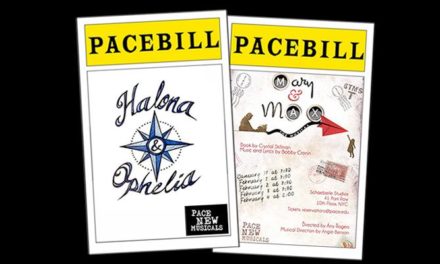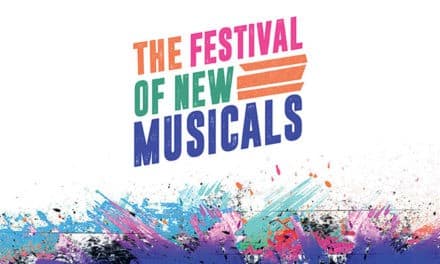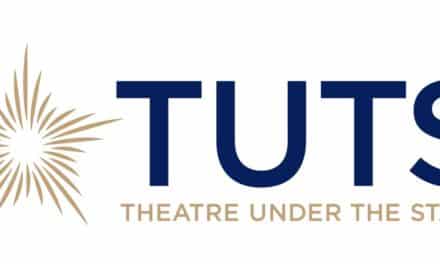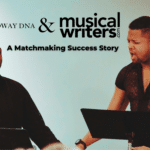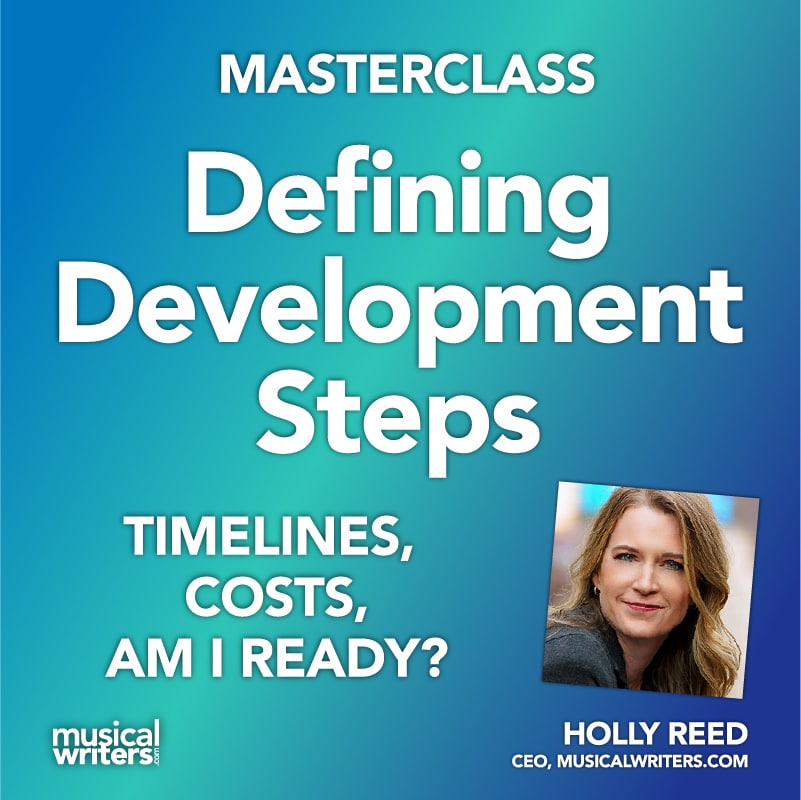Michael Philip O’Brien, his younger sister, Megan Nicole O’Brien, and his college friend, Steve Pacek, all grew up in towns north of Philadelphia. But, little did they suspect that the lives they envisioned for themselves in the theater would play out in The City of Brotherly Love.
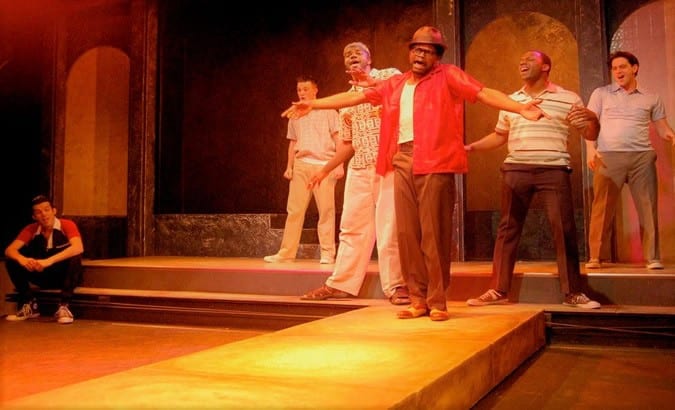
New musical production: Avenue X with Kevin Duffin, Craig Patrick O’Brien, Carl Clemons Hopkins, Forrest McClendon, Lee Edward Colston II and Michael Philip O’Brien
Yet, after training for stage careers and beginning to work professionally, they returned to Philadelphia to start the 11th Hour Theatre Company – a producing entity that, at the time of its founding in 2003, was the municipality’s only theater solely dedicated to the presentation of musicals. 14 years later, their theater’s focus remains much the same and includes a commitment to the development of new works. “Philly is a town where, every season, there are multiple world premieres of plays, but very, very few premieres of musicals,” says Producing Artistic Director, Michael O’Brien. “So, we feel like we’re in a unique position to lead that charge.”
The O’Briens are from the blue-collar town of Horsham, PA. Michael O’Brien was introduced to the performing arts at the age of 5 when his mother enrolled him in a dance class to dissuade him from getting involved in martial arts. “It was not my favorite thing,” O’Brien jokes. “But, then I really started to enjoy it.” At age 10, his grandfather treated him to voice lessons and, before long, he was auditioning for his first show: a dinner theater production of The Music Man. “It was a very bad experience,” he remembers. “I forgot all of my lyrics. So, I started to cry.” Nevertheless, he was cast and eventually took over the role of Winthrop. “From then on, I never looked back,” O’Brien says.
O’Brien began his professional training in the musical theater program at Ithaca College, where he met Steve Pacek, before transferring to NYU’s Tisch School of the Arts to complete his studies. Megan O’Brien followed suit with a degree from Philadelphia’s University of the Arts where she studied directing. Pacek completed his degree at I.C. and joined O’Brien in New York where the two young actors began to pound the pavement. “Steve and I kept getting work back in Philadelphia,” O’Brien recalls. “We happened to be home for the summer of 2003. I had just produced a concert version of The Who’s Tommy at a little Off-Broadway theater in New York. It was a one-weekend event that sold out, but was so expensive that we lost money.”
Undaunted O’Brien and Pacek decided to take another stab at self-production. So, they got together with Megan O’Brien in the town of Lansdale, PA, where Pacek had been raised, and put together a cabaret that they performed at the Montgomery Theater in nearby Souderton. “It was the opposite of New York,” O’Brien says. “We made money! And that was the beginning of 11th Hour – the idea that we could actually create our own work.” We recently chatted with Michael O’Brien to learn about what happened next.
Musical Writerzine: I understand that 11th Hour’s emphasis has been on performing new or lesser-known musicals, from 2005, when you presented Jonathan Larsen’s tick, tick…BOOM! and an original ten-minute musical titled Angst, to today. Was that decision economic or artistic or a little of both?
Michael O’Brien: “A little of both. From the beginning, we’ve all believed that an intimate musical theater experience was very different from the spectacle driven shows that people are used to. You can challenge your audience if you’re up close and personal in ways that you can’t if you’re thirty rows back in the balcony. So, we needed to perform small venues to get that intimacy, where the acting is the most important part of telling the story. That allows us to showcase the kind of musical theater that we want to with subtly and realism. And it makes a lot of economic sense.”
MW: You’ve mounted readings of a lot of new musicals – like Austentatious, Rooms: A Rock Romance, Dani Girl, Factory Girls — and fully produced shows like Field Hockey Hot, Lizzie and, this past May, Big Red Sun. Were these properties that were pitched to you or did you go out and find them?
O’BRIEN: “At first, it was about us looking for them. Nobody knew who we were. So, we were connected to new shows through friends, etc… But, in the last five or six years, we’ve gotten a reputation regionally and in New York. So, now we get a lot of pitches — between ten and fifteen shows a year. But, the type of work we do is do is very specific and we only produce one full-scale show per season. So, the majority of the work that we’ve done has been Philadelphia premieres – regional, if not national or world premieres. That’s something that we’re all extremely passionate about.”
MW: At this point 11th Hour doesn’t have a permanent home. Where are your performances held?
O’BRIEN: “We rent space throughout the city. This season, all of our Next Step Concert Series is at the new Drake Theater (Interact Theatre) run by the Interact Theatre Company. They have two performing spaces in the old Drake Hotel. All three concerts will be there. The main stage show will be at Christ Church Neighborhood House (neighborhood-house.com), which is right next to the Arden Theatre Company. We love that space because it’s a black box. So, we can reconfigure the audience. And our Spotlight Series is in a cabaret setting at World Café Live (worldcafelive.com).

New musical reading of Lizzie at the Next Step Concert Series with Rachel Brennan, Cara Noel Antosca, Alex Keiper and Meredith Beck
MW: Let’s talk about the Next Step Concert Series. It consists of of Equity Approved 29-hour readings, with 20 hours of rehearsal and 3 performances?
O’BRIEN: “Exactly. A lot of writers are looking for their first production. And, a lot of the time, we’re not able to commit to that unless we’ve been involved in the development process. Therefore, we introduce our audience to a new work either in concert form or invited readings. And those are the kinds of shows that we’re able to see all the way to the end. In the Next Step Concert Series, all the actors work from scripts on music stands. But, what we do to make it more theatrical is to have a lighting design and a full band. That enhances the piece, so that it’s not like other staged readings. Most of the time we try to avoid reading staged directions. We started with Equity contracts right off the bat, because we always wanted to be able to cast the best people. So, our shows have always been a hybrid of Equity and non-equity.”
MW: Are you open to submissions for the Next Step Concert Series?
O’BRIEN: “Absolutely! We’re trying to make a name for ourselves and build an audience for new works. The concert series has been a great way for us to encourage them to see shows that are unfamiliar. They’re a theater savvy audience. But, you’re out of the spotlight of New York City. Two of the four Next Step concerts that we’ve done in the last two years were new works. And this season our main stage show is a World Premiere of Big Red Sun.”
MW: Are there things that writers should consider before submitting – such cast size or subject matter?
O’BRIEN: “For the concerts casts can range up to 10 or 12 people. However, the largest show that we’ve fully produced was 10. And we try to keep it 6 to 8 at the most. As for subject matter or style, if it’s not right for us and we feel it’s a piece that’s unique we’ll try to pass it along. There was a musical that came our way through a friend. It wasn’t an 11th Hour show. So, I reached out to people I know at the Walnut Theater and sent it around to them. We have a lot of connections. The musicals that set themselves apart are the ones that have a unique perspective, even if the script and the score need a lot of work. So, the question that we always ask writers is: what makes your show unique? You need to figure out what makes your voice different from the thirty other shows out there that are similar.”
If you wish your work to be considered for the Next Step Concert Series, 11th Hour prefers that submissions be sent electronically to info@11thhourtheatrecompany.org. At minimum, you should include a synopsis, a short sample of the libretto, samples of the piano / vocal score and demo recordings of songs from the score. However, you are welcome to include additional materials, such as the full libretto, bios and a development history. “Whatever they want to submit, we will happily accept,” O’Brien says. The turnaround time for a response to your submission is typically between three and six months. “If you don’t hear back from us right away, do not be discouraged,” O’Brien adds. “We will let you know either way.”
Interview conducted by guest contributor Bill Squier.

